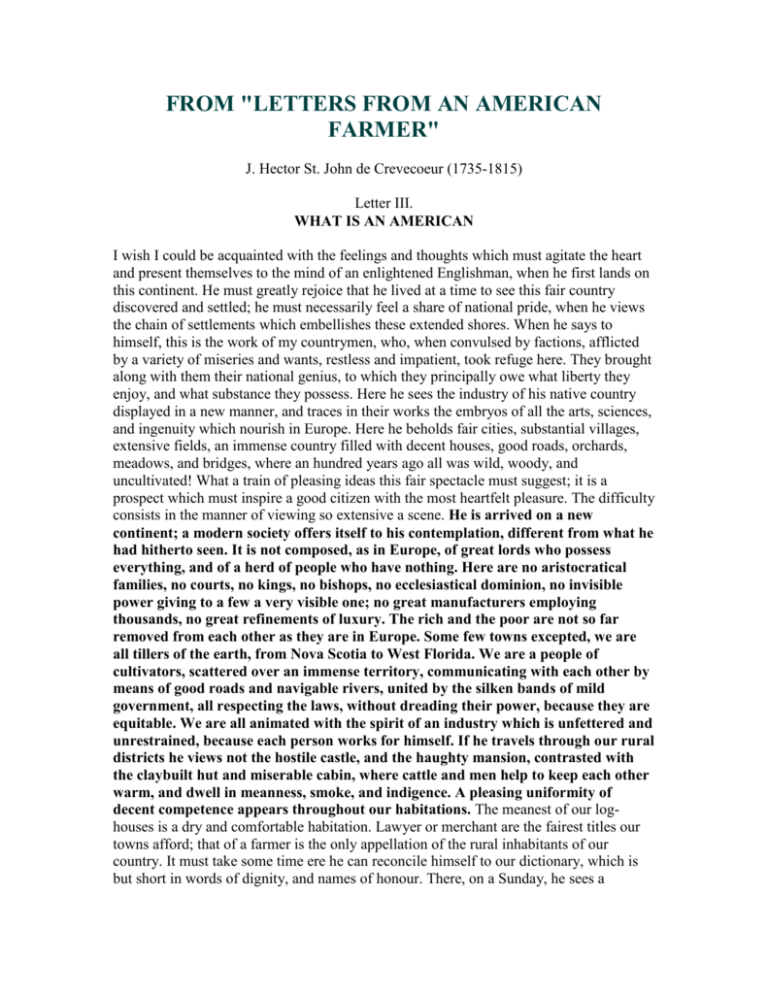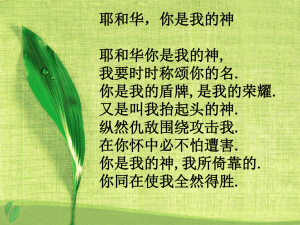What is an American? - Classroom Law Project
advertisement

FROM "LETTERS FROM AN AMERICAN FARMER" J. Hector St. John de Crevecoeur (1735-1815) Letter III. WHAT IS AN AMERICAN I wish I could be acquainted with the feelings and thoughts which must agitate the heart and present themselves to the mind of an enlightened Englishman, when he first lands on this continent. He must greatly rejoice that he lived at a time to see this fair country discovered and settled; he must necessarily feel a share of national pride, when he views the chain of settlements which embellishes these extended shores. When he says to himself, this is the work of my countrymen, who, when convulsed by factions, afflicted by a variety of miseries and wants, restless and impatient, took refuge here. They brought along with them their national genius, to which they principally owe what liberty they enjoy, and what substance they possess. Here he sees the industry of his native country displayed in a new manner, and traces in their works the embryos of all the arts, sciences, and ingenuity which nourish in Europe. Here he beholds fair cities, substantial villages, extensive fields, an immense country filled with decent houses, good roads, orchards, meadows, and bridges, where an hundred years ago all was wild, woody, and uncultivated! What a train of pleasing ideas this fair spectacle must suggest; it is a prospect which must inspire a good citizen with the most heartfelt pleasure. The difficulty consists in the manner of viewing so extensive a scene. He is arrived on a new continent; a modern society offers itself to his contemplation, different from what he had hitherto seen. It is not composed, as in Europe, of great lords who possess everything, and of a herd of people who have nothing. Here are no aristocratical families, no courts, no kings, no bishops, no ecclesiastical dominion, no invisible power giving to a few a very visible one; no great manufacturers employing thousands, no great refinements of luxury. The rich and the poor are not so far removed from each other as they are in Europe. Some few towns excepted, we are all tillers of the earth, from Nova Scotia to West Florida. We are a people of cultivators, scattered over an immense territory, communicating with each other by means of good roads and navigable rivers, united by the silken bands of mild government, all respecting the laws, without dreading their power, because they are equitable. We are all animated with the spirit of an industry which is unfettered and unrestrained, because each person works for himself. If he travels through our rural districts he views not the hostile castle, and the haughty mansion, contrasted with the claybuilt hut and miserable cabin, where cattle and men help to keep each other warm, and dwell in meanness, smoke, and indigence. A pleasing uniformity of decent competence appears throughout our habitations. The meanest of our loghouses is a dry and comfortable habitation. Lawyer or merchant are the fairest titles our towns afford; that of a farmer is the only appellation of the rural inhabitants of our country. It must take some time ere he can reconcile himself to our dictionary, which is but short in words of dignity, and names of honour. There, on a Sunday, he sees a congregation of respectable farmers and their wives, all clad in neat homespun, well mounted, or riding in their own humble waggons. There is not among them an esquire, saving the unlettered magistrate. There he sees a parson as simple as his flock, a farmer who does not riot on the labour of others. We have no princes, for whom we toil, starve, and bleed: we are the most perfect society now existing in the world. Here man is free as he ought to be; nor is this pleasing equality so transitory as many others are. Many ages will not see the shores of our great lakes replenished with inland nations, nor the unknown bounds of North America entirely peopled. Who can tell how far it extends? Who can tell the millions of men whom it will feed and contain? for no European foot has as yet travelled half the extent of this mighty continent! The next wish of this traveller will be to know whence came all these people? they are a mixture of English, Scotch, Irish, French, Dutch, Germans, and Swedes. From this promiscuous breed, that race now called Americans have arisen. The eastern provinces must indeed be excepted, as being the unmixed descendants of Englishmen. I have heard many wish that they had been more intermixed also: for my part, I am no wisher, and think it much better as it has happened. They exhibit a most conspicuous figure in this great and variegated picture; they too enter for a great share in the pleasing perspective displayed in these thirteen provinces. I know it is fashionable to reflect on them, but I respect them for what they have done; for the accuracy and wisdom with which they have settled their territory; for the decency of their manners; for their early love of letters; their ancient college, the first in this hemisphere; for their industry; which to me who am but a farmer, is the criterion of everything. There never was a people, situated as they are, who with so ungrateful a soil have done more in so short a time. Do you think that the monarchical ingredients which are more prevalent in other governments, have purged them from all foul stains? Their histories assert the contrary. . . . What attachment can a poor European emigrant have for a country where he had nothing? The knowledge of the language, the love of a few kindred as poor as himself, were the only cords that tied him: his country is now that which gives him land, bread, protection, and consequence: Ubi panis ibi patria, is the motto of all emigrants. What then is the American, this new man? He is either an European, or the descendant of an European, hence that strange mixture of blood, which you will find in no other country. I could point out to you a family whose grandfather was an Englishman, whose wife was Dutch, whose son married a French woman, and whose present four sons have now four wives of different nations. He is an American, who, leaving behind him all his ancient prejudices and manners, receives new ones from the new mode of life he has embraced, the new government he obeys, and the new rank he holds. He becomes an American by being received in the broad lap of our great Alma Mater. Here individuals of all nations are melted into a new race of men, whose labours and posterity will one day cause great changes in the world. Americans are the western pilgrims, who are carrying along with them that great mass of arts, sciences, vigour, and industry which began long since in the east; they will finish the great circle. The Americans were once scattered all over Europe; here they are incorporated into one of the finest systems of population which has ever appeared, and which will hereafter become distinct by the power of the different climates they inhabit. The American ought therefore to love this country much better than that wherein either he or his forefathers were born. Here the rewards of his industry follow with equal steps the progress of his labour; his labour is founded on the basis of nature, SELFINTEREST: can it want a stronger allurement? . . . Men are like plants; the goodness and flavour of the fruit proceeds from the peculiar soil and exposition in which they grow. We are nothing but what we derive from the air we breathe, the climate we inhabit, the government we obey, the system of religion we profess, and the nature of our employment. . . . What do I say? Europe has no such class of men; the early knowledge they acquire, the early bargains they make, give them a great degree of sagacity. As freemen they will be litigious; pride and obstinacy are often the cause of law suits; the nature of our laws and governments may be another. As citizens it is easy to imagine, that they will carefully read the newspapers, enter into every political disquisition, freely blame or censure governors and others. As farmers they will be careful and anxious to get as much as they can, because what they get is their own. As northern men they will love the cheerful cup. As Christians, religion curbs them not in their opinions; the general indulgence leaves every one to think for themselves in spiritual matters; the laws inspect our actions, our thoughts are left to God. Industry, good living, selfishness, litigiousness, country politics, the pride of freemen, religious indifference, are their characteristics. . . . Europe contains hardly any other distinctions but lords and tenants; this fair country alone is settled by freeholders, the possessors of the soil they cultivate, members of the government they obey, and the framers of their own laws, by means of their representatives. This is a thought which you have taught me to cherish; our difference from Europe, far from diminishing, rather adds to our usefulness and consequence as men and subjects. Had our forefathers remained there, they would only have crowded it, and perhaps prolonged those convulsions which had shook it so long. Every industrious European who transports himself here, may be compared to a sprout growing at the foot of a great tree; it enjoys and draws but a little portion of sap; wrench it from the parent roots, transplant it, and it will become a tree bearing fruit also. Colonists are therefore entitled to the consideration due to the most useful subjects; a hundred families barely existing in some parts of Scotland, will here in six years, cause an annual exportation of 10,000 bushels of wheat: 100 bushels being but a common quantity for an industrious family to sell, if they cultivate good land. It is here then that the idle may be employed, the useless become useful, and the poor become rich; but by riches I do not mean gold and silver, we have but little of those metals; I mean a better sort of wealth, cleared lands, cattle, good houses, good clothes, and an increase of people to enjoy them. There is no wonder that this country has so many charms, and presents to Europeans so many temptations to remain in it. A traveller in Europe becomes a stranger as soon as he quits his own kingdom; but it is otherwise here. We know, properly speaking, no strangers; this is every person's country; the variety of our soils, situations, climates, governments, and produce, hath something which must please everybody. No sooner does an European arrive, no matter of what condition, than his eyes are opened upon the fair prospect; he hears his language spoke, he retraces many of his own country manners, he perpetually hears the names of families and towns with which he is acquainted; he sees happiness and prosperity in all places disseminated; he meets with hospitality, kindness, and plenty everywhere; he beholds hardly any poor, he seldom hears of punishments and executions; and he wonders at the elegance of our towns, those miracles of industry and freedom. He cannot admire enough our rural districts, our convenient roads, good taverns, and our many accommodations; he involuntarily loves a country where everything is so lovely. When in England, he was a mere Englishman; here he stands on a larger portion of the globe, not less than its fourth part, and may see the productions of the north, in iron and naval stores; the provisions of Ireland, the grain of Egypt, the indigo, the rice of China. He does not find, as in Europe, a crowded society, where every place is overstocked; he does not feel that perpetual collision of parties, that difficulty of beginning, that contention which oversets so many. There is room for everybody in America; has he any particular talent, or industry? he exerts it in order to procure a livelihood, and it succeeds. Is he a merchant? the avenues of trade are infinite; is he eminent in any respect? he will be employed and respected. Does he love a country life? pleasant farms present themselves; he may purchase what he wants, and thereby become an American farmer. Is he a labourer, sober and industrious? he need not go many miles, nor receive many informations before he will be hired, well fed at the table of his employer, and paid four or five times more than he can get in Europe. Does he want uncultivated lands? thousands of acres present themselves, which he may purchase cheap. Whatever be his talents or inclinations, if they are moderate, he may satisfy them. I do not mean that every one who comes will grow rich in a little time; no, but he may procure an easy, decent maintenance, by his industry. Instead of starving he will be fed, instead of being idle he will have employment; and these are riches enough for such men as come over here. The rich stay in Europe, it is only the middling and the poor that emigrate. Would you wish to travel in independent idleness, from north to south, you will find easy access, and the most cheerful reception at every house; society without ostentation, good cheer without pride, and every decent diversion which the country affords, with little expense. It is no wonder that the European who has lived here a few years, is desirous to remain; Europe with all its pomp, is not to be compared to this continent, for men of middle stations, or labourers. ... After a foreigner from any part of Europe is arrived, and become a citizen; let him devoutly listen to the voice of our great parent, which says to him, "Welcome to my shores, distressed European; bless the hour in which thou didst see my verdant fields, my fair navigable rivers, and my green mountains!--If thou wilt work, I have bread for thee; if thou wilt be honest, sober, and industrious, I have greater rewards to confer on thee--ease and independence. I will give thee fields to feed and clothe thee; a comfortable fireside to sit by, and tell thy children by what means thou hast prospered; and a decent bed to repose on. I shall endow thee beside with the immunities of a freeman. If thou wilt carefully educate thy children, teach them gratitude to God, and reverence to that government, that philanthropic government, which has collected here so many men and made them happy. I will also provide for thy progeny; and to every good man this ought to be the most holy, the most powerful, the most earnest wish he can possibly form, as well as the most consolatory prospect when he dies. Go thou and work and till; thou shalt prosper, provided thou be just, grateful, and industrious." c. 1769-1780








